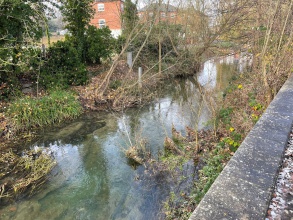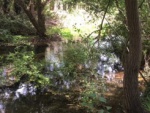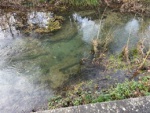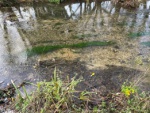Case study:Dysart Park, Grantham Habitat Improvement: Difference between revisions
No edit summary |
Dhutchinson (talk | contribs) No edit summary |
||
| Line 13: | Line 13: | ||
|Contact organisation=East Mercia Rivers Trust | |Contact organisation=East Mercia Rivers Trust | ||
|Contact organisation url=Environment Agency | |Contact organisation url=Environment Agency | ||
|Name of parent multi-site project=Upper Witham Restoration | |||
|Name of parent multi-site project= | |||
|Multi-site=No | |Multi-site=No | ||
|Project picture=Dysart established.jpg | |Project picture=Dysart established.jpg | ||
| Line 23: | Line 22: | ||
This work reduced the need for EA maintenance of the trees in this section of river. | This work reduced the need for EA maintenance of the trees in this section of river. | ||
|Monitoring surveys and results=Visual inspections and photographs of changes. It is clear that even with a resistant clay bed some of the narrowing structures have created scour pool formation. | |||
|Lessons learn=Plan ahead where native Crayfish could be impacted by a project. Ensure you have the necessary permissions to survey for them and where necessary relocate from the project site. | |Lessons learn=Plan ahead where native Crayfish could be impacted by a project. Ensure you have the necessary permissions to survey for them and where necessary relocate from the project site. | ||
Revision as of 11:48, 27 February 2024
Project overview
| Status | Complete |
|---|---|
| Project web site | |
| Themes | Habitat and biodiversity |
| Country | England |
| Main contact forename | Gail |
| Main contact surname | Hutchinson |
| Main contact user ID | |
| Contact organisation | East Mercia Rivers Trust |
| Contact organisation web site | http://Environment%20Agency |
| Partner organisations | |
| Parent multi-site project | |
| This is a parent project encompassing the following projects |
No |
Project summary
The Upper Witham is the ground water fed headwaters of the Witham supporting important species including Native Crayfish and Brown Trout. Historic changes to the river for milling and land drainage have however degraded habitat especially in urban areas such as Grantham.
The project aimed to restore habitat in an over widened, shaded section of river running alongside a public park in the town. This was done by hinging trees to form berms which helped to narrow the channel and provide lighter. As well as benefiting the habitat, this made the river more visible to near-by residents and park users.
This work reduced the need for EA maintenance of the trees in this section of river.
Monitoring surveys and results
Visual inspections and photographs of changes. It is clear that even with a resistant clay bed some of the narrowing structures have created scour pool formation.
Lessons learnt
Plan ahead where native Crayfish could be impacted by a project. Ensure you have the necessary permissions to survey for them and where necessary relocate from the project site.
This project also planned to install a rock ramp on a weir downstream, but this could not be taken forward due to site access during Covid.
Image gallery
|
Catchment and subcatchmentSelect a catchment/subcatchment
Catchment
Subcatchment
Other case studies in this subcatchment: Aubourn Rock Ramp and Habitat Works, Belton Floodplain Reconnection and River Restoration, Grantham Blue Green - Urban Reach, Little Ponton, Manthorpe Floodplain Reconnection, Papermill Weir Section in-channel restoration, River Witham Great Ponton, Stainby Road, Colsterworth, Syston and Barkston Restoration, Upper Cringle Floodplain Restoration Project... further results
Site
Project background
Cost for project phases
Reasons for river restoration
Measures
MonitoringHydromorphological quality elements
Biological quality elements
Physico-chemical quality elements
Any other monitoring, e.g. social, economic
Monitoring documents
Additional documents and videos
Additional links and references
Supplementary InformationEdit Supplementary Information
| ||||||||||||||||||||||||||||||||||||||||||||||||||||||||||||||||||||||||||||||||||||||||||||||||||||||||||||||||||||||||||||||||||||||||||||||||||||||||||||||||||||||||||||||||||||||||||||||||||||||||





